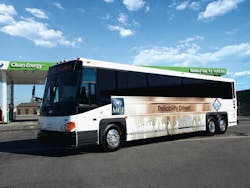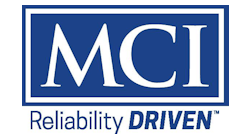NJ: MCI to Deliver 84 CNG Commuter Coaches to NJ Transit
MCI announced that NJ Transit has awarded it a contract for 84 natural-gas-fueled MCI Commuter Coaches with wheelchair lifts. The new CNG coaches will replace coaches that have each logged more than a half a million miles. Delivery will begin in late 2014.
The first U.S. agency to purchase CNG MCI Commuter Coaches, NJ Transit took delivery of 50 of the CNG coaches in 1999 as part of a pilot program, ordering an additional 27 CNG units the following year.
Over the last three decades, MCI has supplied more than 2,350 commuter coaches to NJ Transit, which was one of the first agencies to the use the coach to extend its reach into outlying city and suburban areas to better serve the state’s commuter population.
ADA and Buy America compliant, the MCI Commuter Coach is available in clean-diesel, hybrid or CNG configurations. Durably built with a rugged semi-monocoque structure, the MCI Commuter Coach elevates passengers and drivers above traffic for safety and comfort at highway speeds. The MCI CNG Commuter Coach offers exceptionally low carbon dioxide emissions and lower fuel costs, while supporting domestic energy production.
According to the U.S. Department of Energy's Alternative Fuels and Advanced Vehicles Data Center, natural gas vehicles offer lower operating and maintenance costs; many fleets report 15 percent to 28 percent savings compared with diesel fleets.
“MCI greatly values NJ Transit and its mission to provide its ridership comfort, dependability and energy alternatives for a greener future,” said Patrick Scully, MCI executive vice president of sales and marketing. “We are committed to providing NJ Transit with high-quality coaches and aftermarket services to further enhance its already strong reputation for reliable commuter express service.”
MCI won its first contract with NJ Transit for 700 MC-9 cruiser buses in 1982; the agency purchased another 415 units in 1987. In 2000, NJ Transit awarded a contract to MCI for 1,400 Commuter Coaches, which at the time was the largest bus transaction ever recorded by a transit agency.




